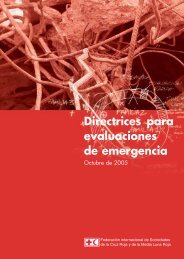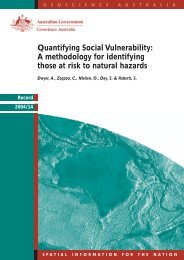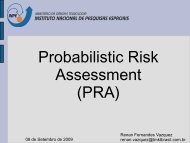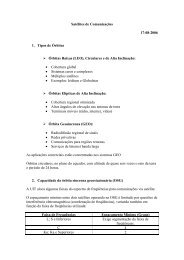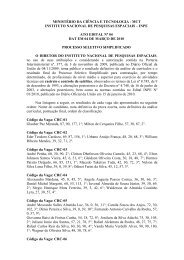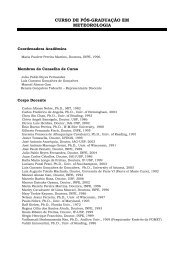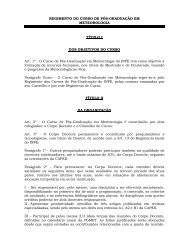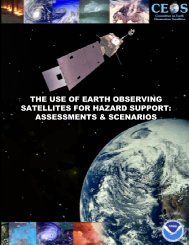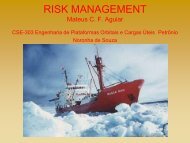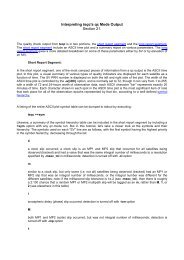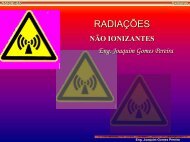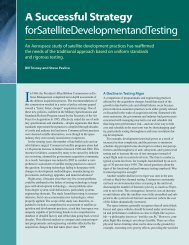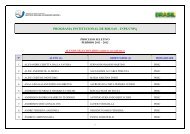Living with Risk. A global review of disaster reduction initiatives
Living with Risk. A global review of disaster reduction initiatives
Living with Risk. A global review of disaster reduction initiatives
Create successful ePaper yourself
Turn your PDF publications into a flip-book with our unique Google optimized e-Paper software.
1<br />
<strong>Living</strong> <strong>with</strong> <strong>Risk</strong>: A <strong>global</strong> <strong>review</strong> <strong>of</strong> <strong>disaster</strong> <strong>reduction</strong> <strong>initiatives</strong><br />
Until recently, the relationship between environmental<br />
degradation and mismanagement,<br />
hazard incidence and vulnerability was a nonissue<br />
in most regions and countries except for<br />
lip-service. Neither the subject nor the designated<br />
authorities for <strong>disaster</strong> management were<br />
thought to be relevant for ecologists and environmentalists.<br />
There was little discussion, and<br />
even less organizational contact, linking the<br />
perceived interests <strong>of</strong> environmental management<br />
and the dynamics associated <strong>with</strong> risk<br />
<strong>reduction</strong>. In fact, the primary actors frequently<br />
considered one another to be antagonists,<br />
struggling to represent forces either empowering<br />
the interests <strong>of</strong> the people or expanding the<br />
uncompromising power and authority <strong>of</strong> the<br />
State, <strong>of</strong>ten played out over competing uses <strong>of</strong><br />
land and natural resources. It should also be<br />
recalled that the existence <strong>of</strong> environmental<br />
divisions in bilateral and multilateral agencies<br />
as well as <strong>of</strong> environmental ministries was not<br />
the norm during the 1980s.<br />
Long-term environmental changes and <strong>disaster</strong>s<br />
At the beginning <strong>of</strong> the 21st century, there is, particularly in<br />
Pacific island developing states, growing concern about the<br />
long-term consequences <strong>of</strong> climate change, the El Niño phenomenon<br />
and the potential for rising sea levels. In recognizing<br />
the heavy dependence <strong>of</strong> small island developing states on the<br />
natural environment and that they are exposed to almost all<br />
types <strong>of</strong> natural, technological and human-related hazards,<br />
there is a strong rationale for considering all these hazards in a<br />
generic sense as ultimately being environmental hazards.<br />
Environmental impact is precisely the premise for <strong>disaster</strong><br />
<strong>reduction</strong> in five generic environments:<br />
• Built environment – property, buildings, infrastructure<br />
• Natural environment – geography, physiology<br />
• Human environment – human life, socio-economic factors<br />
integral <strong>with</strong> the surface <strong>of</strong> the earth<br />
• Terrestrial environment<br />
• Marine environment<br />
This changed dramatically in the closing years<br />
<strong>of</strong> the 1990s in Latin America and the<br />
Caribbean. El Niño and Hurricanes Georges<br />
and Mitch focused attention on the importance<br />
<strong>of</strong> the full range <strong>of</strong> the hydrological cycle to<br />
both development and <strong>disaster</strong> concerns. The<br />
magnitude <strong>of</strong> the resulting fires, drought,<br />
flooding and landslides associated <strong>with</strong> these<br />
<strong>disaster</strong>s inevitably stimulated discussion about<br />
the relationships that exist between environmental<br />
mismanagement and the occurrence <strong>of</strong><br />
hazards. One <strong>of</strong> the most important <strong>initiatives</strong><br />
was the CCAD publication, Strategy for the<br />
Reduction <strong>of</strong> Environmental Vulnerability in Central<br />
America when Faced <strong>with</strong> Natural Disasters:<br />
Environmental Management and the Evaluation<br />
<strong>of</strong> Vulnerability, (May 1999). Produced <strong>with</strong> the<br />
collaboration <strong>of</strong> the Economic Commission for<br />
Latin America and the Caribbean (ECLAC),<br />
UNDP, UNEP and the World Bank, this<br />
document provided an overview <strong>of</strong> the <strong>disaster</strong><br />
and vulnerability problems in the region and<br />
proposed many wide-ranging projects for<br />
financing as part <strong>of</strong> the international process to<br />
rehabilitate the Central American region. The<br />
content <strong>of</strong> the proposals went quite beyond<br />
environmental problems, touching on almost<br />
every foreseeable topic <strong>of</strong> interest to risk analysts<br />
and managers.<br />
Concluding remarks<br />
Despite the progress achieved, much more is<br />
required to implement institutional changes<br />
favouring the evolution <strong>of</strong> a <strong>disaster</strong> <strong>reduction</strong><br />
culture. The processes conditioning the emergence<br />
<strong>of</strong> <strong>disaster</strong> <strong>reduction</strong> need to be conducive<br />
to risk and vulnerability understanding,<br />
awareness and management, leading to longterm<br />
safe development planning based on<br />
anticipation rather than cure.<br />
Disaster <strong>reduction</strong> strategies drawing upon<br />
sustainable development concepts should be<br />
proactive, and, on a continuous basis. They<br />
should promote political commitment, financial<br />
rationale, environmental sensibility and<br />
cultural awareness. Such a shift in mentality<br />
should, in particular, meet the mitigation<br />
requirements imposed by the slow-onset <strong>disaster</strong>s<br />
that <strong>global</strong> environmental changes will<br />
bring about.<br />
38



